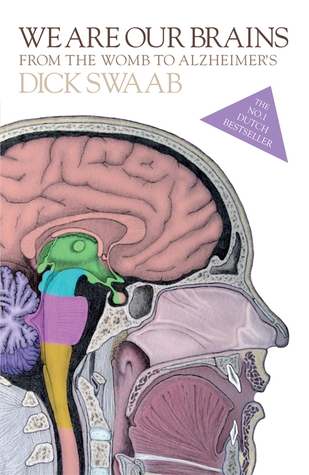I don’t particularly argue with the premise of this, but the constant emphasis on how everything is pre-determined for us before we’re even born… I prefer to live my life as if I have free choices, as if I’m a unique person formed by all sorts of circumstances over time, not just by stress chemicals my mother released while I was gestating. As if I’m responsible for, if not what I am, then what I do with what I am. Swaab’s research removes even that responsibility, if you follow it logically: if paedophilia is caused by something in the brain, and successfully inhibited in some people by their amygdala, that leaves people with the defence, “Oh, my amygdala is too small to inhibit these urges, it’s not my fault.”
You can extend that argument forever, and then what’s the point in living? We don’t experience it as just a series of chemical processes.
I also noted that Swaab avoids addressing some things. I looked in the index for any mention of asexuality, for example — surely he must have considered studying people who don’t feel sexual attraction, in all of this? Apparently not. You can’t check up on any of his results and conclusions, because there are no references. He claims that socialisation has nothing to do with gender-based preferences in toys and later, by extension, professions. Tomboyish girls are, in his book, girls gone wrong: they just have too much testosterone, so they don’t prefer the things that biologically (he says) they should.
I don’t like the way this book tackles the subject, even where I know that other research backs him up. I don’t like his attitude to other experts, to people who question his results, or… well, any of it. I’ve read most of this stuff before, but presented with much more care and consideration. I find something about Swaab’s whole attitude distasteful.
Rating: 1/5


I’ll believe my thoughts are nothing but pure physical reactions – that there’s really no free will – when you could project my thoughts into a screen or read them, and not just vaguely. Until I get this proof, all the “Well, this neuron connection thingie hints you thought about sex during the day” means nothing.
What about the cases where a tumour has altered someone’s behaviour? For example, the guy who got paedophilic urges due to a tumour. They went away when the tumour was removed, and recurred when it grew again. There are lots of documented cases of brain damage causing personality changes. And you can take out the ability to express very specific concepts — you can damage the part of the brain that lets you use adjectives in speech and thought, for example.
So yeah, based on what I know about neuroanatomy, I have some doubts about free will (at least, I very much doubt that we have total free will). But I think that doesn’t really matter; there’s no point in living as though we can’t control ourselves. That abdicates responsibility entirely, and it’s not the way we experience the world.
There is an argument that we can’t just measure the activity of a couple of neurons and project a thought on the screen. You’d have to either tap into the whole brain (which would be very difficult, as you’d damage the brain in doing so), or pick a very specific area in the cortex and ask the person to think thoughts related to that area of the brain, which would be predetermining the result.
free will is a religious concept
it helps explain how if God has the power to stop bad things she is not evil when she doesn’t.
philosophically and scientifically it’s just a silly question
I think it’s also a thing which we assume to be true, because that’s the way we experience the world. We think we make choices — whether we’re religious or not. Else there’d be no agonising over making choices.
Of course, if there’s no free will, it’s really pointless for you to respond to someone who dislikes the idea of there being no free will. They are not free to believe it or not, but locked into it; there’s a chance, I suppose, that your words could change them (and of course you in turn can’t help but comment), but it does seem likely to be pointless in the majority of cases.
Honestly, I haven’t read all the book but what I read I find it to be wonderful. You have to read with an open mind. I understand that most points in the book you don’t agree with. But when you really start to understand life someone must learn that yes, everyone have free will into choosing who to become. Just certain events in life people forgot a sense of who they are. Reading this book brought some good points of what I saw in my life. Not everything is tied but I do see the truth. I was just not analyzing my life fully like that. But again who gets to control someone thinking except oneself.
I did read it with an open mind: as a scientist, and as a person. As a scientist, he lacked references, which means he might as well be writing fairy tales; as a person, I disliked his approach. That doesn’t mean my mind was closed, that means he’s a very poor scientist and not my kind of human.
Interesting why would you say that. As a scientist, what references did he leave out or didn’t choose to put out? which ones you thought it was a fairytale? And as a person, why didn’t you like his approach? What did he wrote that made you think he’s not your kind of human?